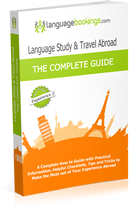Obten la Guía Completa para Estudiar en el extranjero!
 -¿Dónde ir para estudiar en el extranjero?
-¿Dónde ir para estudiar en el extranjero?
-Sugerencias para encontrar los mejores cursos de idiomas
-¿Cómo aprovechar al máximo tu experiencia de estudio en el extranjero?
¡Y mucho más!
Toda la información necesaria en un solo lugar. Contiene todo que usted necesitará siempre para obtener el máximo rendimiento de tu curso de idiomas y tener la mejor experiencia en el extranjero!
Odiamos el spam tanto como usted lo hace, usted puede confiar en nosotros, su dirección de correo electrónico estará a salvo con nosotros!
* Registro requerido








 -¿Dónde ir para estudiar en el extranjero?
-¿Dónde ir para estudiar en el extranjero?